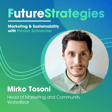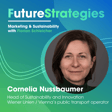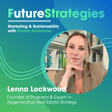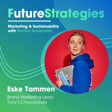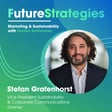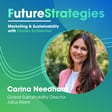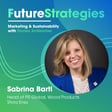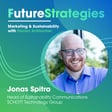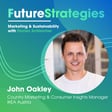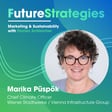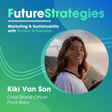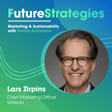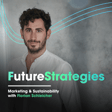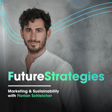Introduction to European Sustainability Reporting Standards
00:00:00
Speaker
the ESRS kind of presume that climate change is relevant for every company. And if you determine that it's not, then you need to explain why. It's also just a very great tool to actually engage in communication, right?
Podcast Introduction by Florian Schleicher
00:00:18
Speaker
Welcome to the Future Strategies Podcast. My name is Florian Schleicher. I'm a marketing strategist focused on sustainability. And I'm your host here. Every two weeks, you can listen to my interviews with international experts
00:00:31
Speaker
And together, we will explore where marketing strategies and sustainability intersect with great examples, insightful stories, and a look behind the scenes of some amazing brands. If you are curious how to apply all of that for your own business, I do this for my clients from all around the world through inspiring workshops, guiding mentoring, and an exciting on online academy. But more on that at the end of
Guest Introduction: Veronica Montes on ESG
00:00:55
Speaker
this episode. Now, let's jump into today's interview. Today, my guest is Veronica Montes. She's a corporate lawyer with a focus on capital markets and M and&A transactions. She also counsels companies, boards and investors on and after IPOs, advises on public takeovers,
00:01:15
Speaker
And furthermore, and this is why we're talking today, Veronica counsels, corporates, funds and multinational businesses on the impact of environmental, societal and governance matters, short ESG and sustainability laws, as well as regulations, especially reporting obligations and compliance with CSRD and CS3D. Welcome to the show, Veronica. Hi, I'm very happy to be here.
00:01:41
Speaker
Yeah, me too. So we met a couple of months ago back in Berlin at a panel discussion where you were the legal expert. I was the marketing expert. And what I really found fascinating was from the beginning, first, your expertise on ESG and second, how you also were able to convey these sometimes complicated facts to an audience of beginners in a very simple way.
00:02:04
Speaker
So I thought this will for sure be also interesting to many people, which is why I asked you to come on the show and speak with me here today.
Simplifying ESG Legal Matters
00:02:12
Speaker
Yeah, great. And I think, I mean, that is always something that I aim for to make complicated and complex legal matters um understandable and approachable to many. But I think it's especially important and for a subject matter such as ESG and sustainability, which is thought so interdisciplinary. So you're not just talking with legal folks, but we're you're talking to marketing experts like yourself.
00:02:42
Speaker
and to board members, to employment and labor experts. So it is it is just i such ah such a big field and I think therefore it's very important to find like a common um language that that everyone understands.
00:02:57
Speaker
Yeah, totally. Before you go deeper on the real issues, I would be super curious what drew you to specialize in ESG law, and what do you find most rewarding about working in this field? Sure. I mean, I think that with ESG, in a way, it is not something that I necessarily saw sought out, but it kind of it kind of found
Veronica's Journey from Capital Markets to ESG
00:03:21
Speaker
me. and i'm But like in hindsight, I'm very happy with that.
00:03:26
Speaker
And I find find it a very rewarding field. I mean, my background in capital markets is I'm working with a lot of clients on disclosure work. So with all of the new ESG laws and especially CSRD, which has a very large focus on transparency and the sustainability reporter statement that statement that will have to come out.
00:03:51
Speaker
It was just a very natural fit because of my prior disclosure work to also yeah specialize and and dive into ESG. One key thing that I want to talk with you about today is reporting, of course. So let's just start with the basics. I will give a short introduction on the reports and please correct me because you're the legal expert here. But from my understanding, starting January 1st, this year, 2024,
00:04:18
Speaker
The European Sustainability Reporting Standards, or ESRS, will become mandatory for around 50,000 companies in
Mandatory ESRS for EU Companies
00:04:26
Speaker
the EU. and This will also affect ah companies with more than 250 employees, and this requires them to have a report where the outline they their financial credentials, but also their sustainability credentials on what they are doing and what their impact is when it comes to our planet, the environment and sustainability. So these reports must contain comprehensive information on environmental, social and governance, ESG issues, and document also the progress and impact of their sustainable business practices. Did I get that right?
00:05:03
Speaker
The essentials were definitely correct.
CSRD Obligations and Impact
00:05:05
Speaker
I think what I like to start with is that one of the big reasons why CSRD is like seeking the attention or has gained so much attention from from corporates around the world is that it it really extends and expands the non-financial disclosure obligations, which before only hit listed companies mostly and also some public interest companies to now also um expand those reporting obligations to non-listed companies, so-called large companies, which I need to fulfill two out of the three criteria, which is for two consecutive years, they must have had at least 250 employees.
00:05:54
Speaker
And, or 50 million turnover and, or 25 million in total assets. That's kind of the next big wave of companies that are going to be in scope from first of January, 2025 going forward. And then there is a, even a third wave, which is going to hit listed small and medium price enterprises. And then the last one is going to start January 1st, 2028 for non-European parent entities.
00:06:24
Speaker
if they have a large subsidiary or a branch with 40 million revenue in the EU and also as a whole um have a total net turnover of 150 million in the European Union. So that's kind of roughly the scope and this first and wave of CSID reporting obligations, which is going to hit the listed and public interest entities.
00:06:52
Speaker
actually already started January 1st, 2024 or really like financial years or fiscal years starting on or after a January 1st, 2024. So that's kind of roughly like the requirements and it's really important to analyze for companies like which wave they fall into or which phase.
Standardizing Sustainability Reporting
00:07:15
Speaker
And then the second thing that's very um important to note about CSRD also, and that is really the ESRS that you mentioned, the European Sustainability Reporting Standards, which I like to call them kind of like the equivalent of what IFRS are for financial reporting. So they really like those ESRS kind of try to bring sustainability reporting like on par with and financial reporting. So it's really about comparability of information standardization such that stakeholders and investors can really like compare sustainability information like across companies.
00:07:57
Speaker
and And that's what I really find fascinating and super exciting because finally, we will have, as you mentioned, the possibility to compare companies' performance based on their sustainability efforts. I think this is a huge step.
00:08:12
Speaker
which the EU has taken, but also a big challenge for a lot of companies. So what do you think is or are the biggest challenges that the companies face when they need to work on their first ESG reporting?
Challenges in Implementing ESRS
00:08:29
Speaker
Yeah, that's the next thing. So I mean, I think the ESRS document, I think it's like 250 pages, roughly, right? There's a lot of different parts to it.
00:08:40
Speaker
but I mean, it's ah it's a really large document. So just understanding it takes time and understanding the whole logic of CSRD and ESRS is also difficult. You only need to report on certain specific sustainability to topics if you have reached the conclusion under a double materiality assessment that a topic is either a material from a financial or an impact perspective.
00:09:10
Speaker
So financial is kind of like the topic has in like has influence or impact on you as a company. And so it's the the outside in perspective. And the impact materiality is the inside out perspective, where you have an impact, for example, on the environment with what you're doing under a certain topic.
00:09:32
Speaker
And already also managing that double materiality assessment and in order to find out what topics do I actually need to report on is also like quite a large endeavor, right? So you also need to plan time in order to do that. And then depending on the size of your operations,
00:09:54
Speaker
it's also it's it It might be a lot of topics that you have to report on. It could be that you have topics that are not even part of yeah ESRS, but that you nevertheless need to report on. And then you also need to collect all of the data. right And I think one of the big challenges that es g operations are ESG ESG Specialists were facing in the past or still are facing is that so much of the data is not comparable because you might have subsidiaries and operations in many different countries. There might be different systems, different operators.
00:10:34
Speaker
and bringing all of that together and making sure that that data is actually supported, that it reaches a certain quality yeah is is going to be very difficult. And I think that's one of the biggest challenges.
00:10:50
Speaker
Yeah, I totally agree because in the end, like this is something new and whenever something new happens, it requires a lot of effort to first getting used to it. So I see that I currently work with one client on their new report and mostly on making it marketing fit.
00:11:09
Speaker
Because in the end, those new reportings, there are lots of companies who have already done sustainability reports in the past. But this was something they did because they thought it's necessary and they wanted to do it. Now they have to do it and there are all these requirements. And what I think is if you have to invest that much time and that many resources in preparing this new report,
00:11:33
Speaker
you should also use everything you can for your marketing then to communicate about it. Because otherwise, this is a report that maybe some investors, maybe some legislators read, and the rest is just lying around there. So I'm a big advocate for actually using all this potential because I think there is a huge potential when we communicate about our sustainability efforts. But I think the problem is that per se, those reports are not sexy.
00:12:03
Speaker
And for marketing, everything has to be sexy and has to be appealing. And we have to put on the customer's point of view to really deduct what can help me to reach my target audience, be that customers or investors. Because I think investors would also like to have, yes, all the factual information and the data in the lists as required, but also to have it in a nicer way. This is a potential that we can use for sustainability communications also. Yeah, I mean, absolutely. It's just like the financial reporting and like the financial, like the annual report, right? I mean, the sustainability statement of European companies is even going to form part of the management report. so
00:12:48
Speaker
I mean, it really shows the importance that it actually has. like It just becomes an integral part of a company's reporting. So yeah I think going forward, one doesn't really, or the EU doesn't really want companies to differentiate that much between financial and sustainability impacts anymore. i mean whether um investors other stakeholders are actually going to place the same relevance on sustainability data as they do on financial data remains to be seen but i mean that's in a way also the the goal of the european union um with that.
00:13:31
Speaker
with that legislation. yeah And I mean, I think all of the data, the work streams that need to be approached in order to kind of get a grasp on the CSRD reporting, it requires a lot of effort and time. and But I think it's important for companies, especially if they're smaller and if they fall into that second wave that they don't like that they don't fall into a freeze. And that instead of doing nothing, I think it is much better to really analyze and look at where, like, what do we actually already have? You know, especially in the social column, a lot of companies already have data on these social metrics, for example, right? And for a lot of companies under the double materiality assessment, that's also going to be important.
00:14:26
Speaker
then of course climate change is like a very important topic and I think that's something that really not just the EU but also if you look internationally like in the USA for example you have the US you see climate rules but also California rules and also UK you know that's just something where there is so much emphasis on. So I think you also can't really get around it. And that's also like the mindset of the ESRS that generally everyone needs to report on climate change. So I think it's just important to
00:14:59
Speaker
to really focus your attention and try to make the most of it yeah because that fits so well with marketing.
Marketing Opportunities in ESG Reports
00:15:06
Speaker
It's also just a very great tool to actually engage in communication, right? Exactly. And and and I think there is this saying in in PR and marketing, do good and talk about it.
00:15:19
Speaker
You first need to do something good and then you can talk about it. But if you have done the work and also what you said is like sustainability will more and more become a non-negotiable aspect for business with the EU saying, hey, we want one report, financials and sustainability are equally important for this report.
00:15:38
Speaker
You mentioned this freeze status that a lot of companies fall into. And I still remember at the panel discussion, I think I mentioned this, okay, there are of three basic emotions that people use when they are confronted with something. It's fight, flight, or freeze. And a lot of companies fall into that freeze status where they say, oh oh my God, this is all overwhelming. This looks like so much work.
00:16:00
Speaker
I don't want to do anything, then and there are some that are just fleeing and maybe shift more into greenwashing. And then a couple really face it head on and say, okay, we're now going to do this right. And we will approach this with everything that is needed.
00:16:16
Speaker
I would be curious, a lot of big companies, as we've mentioned in the beginning, they are already working on their sustainability reports because they need to. Some will also use it for marketing, but I would be curious for those who don't know what is really necessary for those companies to report on. What are some key elements that every company will have to look into for the future to bring it to their reports?
00:16:42
Speaker
Yeah, I mean, the yeah ESRS are like structured into 12 different standards, so to speak. ESRS 2 is a cross-sectional or cross-sectoral standard that everyone will have to report ah on that is in scope of um CSRD. So it kind of explains the general approach that your corporation takes on sustainability matters. It also talks about the double materiality assessment, like where your main risks and opportunities lie when it comes to sustainability. So it's kind of like the
00:17:20
Speaker
the general section, so to speak. And then when it comes to the 10 sub-topics or topical ESRS, and they're divided into environmental, five environmental topics, four social topics, and one governance topic, especially climate change, which is which is the E1 standard. The yeah ESRS kind of presume that every kind that climate change is relevant for every company.
00:17:50
Speaker
And if it's if you determine that it's not, then you need to explain why. And that is kind of like special when it comes to climate change. But I mean, it's kind of understandable against the background of the Green Deal and that you really trying to to to reach like the Paris goal of reducing um greenhouse gas emissions and reducing, especially reducing and global warming. so and That's also where like a lot of attention obviously is from from investors and also stakeholders, shareholders, and public attention, I would say. like
00:18:30
Speaker
but What about your emissions, right? yeah And then I think the other topics, it's really, I mean, it really depends on the company, right? But I do think that like own workforce, for example, is something that is going to be relevant for a lot of companies governance as well. Yeah, but otherwise I think you really need to look closely at your operations and determine ah what makes sense for you.
00:18:57
Speaker
So I also fully support what you said, like don't fall into greenwashing, but also don't just use like boilerplate language and copy what others are doing yeah because it's not going to be authentic. And that's not going to meet the requirements of of good disclosure and good reporting, right? Like your data cannot be resilient really. Like if you just copy paste without scrutinizing.
00:19:22
Speaker
Yeah. And I think there are a lot of companies that have to work on their reports right now, but I think it will also have a trickle down effect because many of those big companies, they have suppliers and the suppliers might be smaller or medium sized companies, but they will also, because of the different scopes, they will have to go to their suppliers and ask them, Hey, I need your numbers too.
Impact of ESG Reporting on Supply Chains
00:19:45
Speaker
Yes, I mean, there's also value chain, like reporting is is part of ah of CSRD. So I think that's also something that we've actually already seen in the run-up to companies preparing for CSRD reporting is that they're sent out like those questionnaires to their tier one, tier two, so on and so forth, like suppliers and asking for that data. Just doing that obviously is not going to It's not going to fulfill like the legal requirements but it's an important step and I think a lot of companies have also actually worked together with consultants especially like when it comes to emissions to try to really like work through all of the challenges that this
00:20:35
Speaker
poses, which is, it's very important to really like also consult experts. Like on the flip side, I would also say, even if you are not in scope of CSRD, but if you have received those questionnaires or will be receiving questions, don't just like close the document again, yeah because a lot of companies actually say like, if you do not provide this data, we actually won't.
00:21:02
Speaker
work with you anymore. You cannot be a supplier anymore. So it's just important to take it seriously and to work together with with companies. and kind of question it and try to find a solution, but again, not to freeze and do nothing. Yeah. And I think the same applies for companies that work with government contracts because governments will only work with the companies if they can prove and provide examples and data and statistics on what they're actually doing when it comes to ESG.
00:21:33
Speaker
Yeah, I mean, it's just it's it's just getting more and more important. Yeah, with CSRD, since the scope is so wide and also really hitting those small, medium-sized companies, I think it's just really gonna have
Collaboration for Effective Reporting
00:21:48
Speaker
a trick. it It's already having a trickle-down effect, like into the whole economy or economic actors. As those companies, those large companies are preparing for it, especially when you're looking at big, for example, manufacturing companies They're already like going through the whole chain of activities, like requiring a lot of data, not just on the missions, but also it can go like into human rights violations, labor rights, um which are part of that. And yeah, I think there's just going to be a lot more data and and information. Yeah. and And you mentioned this a little bit before where you said you need really a team of experts. I think to be successful in the future,
00:22:33
Speaker
You need kind of a dream team of sustainability experts, legal experts and marketing communication experts because you need to be legally compliant. You need to show that you can have a real impact on sustainability and you have to communicate it effectively. Yeah.
00:22:50
Speaker
One last topic that I want to discuss with you is, of course, there will always be black
Consequences of Non-Compliance in ESG
00:22:56
Speaker
sheep. What legal risks do companies really face if they fail to comply with the reporting standards or if they don't uphold all the things and the information that are actually needed? Yeah. I mean, under CSRD, it's really up to the individual member states to to decide, but i mean essentially, it's and especially in Germany, it's especially fines.
00:23:21
Speaker
And then since it is part of the financial reporting, you can also space scrutiny like as a, as a managing director or as a management board member, even supervisory board member. For example, if there is data that you're putting out that is not.
00:23:37
Speaker
Resilient or reliable right and there's also the big topic of greenwashing right yeah i think greenwashing whenever you're talking about sustainability is relevant but i think the yeah esrs in a way are also a tool to combat greenwashing.
00:23:55
Speaker
and then there is there are also certain other European directives which are going forward going to require certain auditing standards for example to make sure that that the information you're putting out is really like reliable and also actually the the management reporter, the sustainability statement now will also require a limited to audit, right? So the auditor is also going to make sure or should make sure that the data that is being presented is reliable, right? So there is kind of already like a layer of trying to prevent greenwashing built into the process. Like if you try to make
00:24:36
Speaker
Things look better than they actually are that's always kind of a red flag so I always think it's about authenticity and I mean and we have like a few especially if you look Internationally, there's kind of like a divide in approaching CSRD as well like in the EU a lot of times companies think that the more they are going to say the better and Whereas if you look look across the pond, for example, in the US, companies are much more careful in what they're actually putting out there. And I think when it comes to CSRD and ESRS, it really doesn't have to be like the more, the better. i It really all comes down to.
00:25:19
Speaker
doing like the double materiality see assessment correctly and then focusing on what is what is important for your company and then talking about it in an authentic and like reliable manner.
00:25:34
Speaker
Yeah, yes, I have so many more questions, but I think we' we will have to keep that for another time. Before we go to the three final questions, Veronica, I would be curious, do you have any questions for me? Yeah, I mean, in a way, how do you think that marketing folks should think about and approach sustainability reporting?
00:25:54
Speaker
And what do you also think are kind of like the pitfalls from your experience? Yeah, super interesting question and and a very big topic at the moment. I talk with a lot of quite a lot of companies who are currently working on their reports and who are aware that it requires a lot of effort and who want to use
Communicating Authentic Sustainability Stories
00:26:13
Speaker
that. Also, as a potential for marketing, I think probably the most important thing right now in marketing is authenticity.
00:26:19
Speaker
We see that with users who are unfollowing brands that are not authentic, especially big brands struggle a lot with being authentic because they are used to polished images and perfect scenery. But I think it's important to really boil it down and say, okay, what can we really say authentically?
00:26:38
Speaker
when saying, okay, we are really doing something good in this area. And what you just mentioned, that's not about communicating every fine detail that you have in your report. I think it's about going in there, doing your research, finding out where are the stories? Where is something big happening? Where can we actually have a big impact? Where are we already having a big impact? And then finding those stories and authentically communicate them through great storytelling because that's what marketing job is like. We are great at telling stories. We are great at convincing people, creating excitement, sparking all these positive emotions. And I think our job is now to do that also with sustainability because in the end, marketing's job is to influence people.
00:27:22
Speaker
We might as well use it for influencing people to act, behave, buy more sustainably. And we can use the sustainability reports as a base from where we can communicate. I think the great chance is the reports should be done in a way that they are transparent and right. And oftentimes when you work in marketing, the challenge is to find the right data. So now we have the right data.
00:27:46
Speaker
yeah We just need to make it, as I mentioned before, sexy to communicate it to a larger audience. So I think it's about first, finding the authentic and great stories in the report. Second, thinking also about the target audience. What does my target audience really want to hear? And then we have to find a way to communicate those stories that we have found in a brave way. I think far too often,
00:28:14
Speaker
Sustainability is approached as a difficult topic that is hard to understand, that is hard to communicate. It has a certain weight to it whenever we communicate about it. But I think actually we all want a nice future where it's great to live in and where we are proud to raise our kids in.
00:28:33
Speaker
and Marketing can be part of that by just changing the narrative and saying, we have this great opportunity to do something good for everyone, for society and the planet. And let's use the potential of the sustainability reports as kind of a jumping board to start our communications from there.
00:28:51
Speaker
Yeah, I i mean, i I fully support that. And I think it's like a discussion about corporate responsibility. How can a company be like a good corporate citizen in a way? Yes. Maybe that's where things and and conversations are going to develop into also like how do you handle AI, for example, how do you handle crises, I think,
00:29:13
Speaker
that all kind of like also kind of flow from the whole ESG topic. And that's why also I find it, I think it's been it's good it's been a good approach by the EU that they have not just focused on one single factor of ESG. Like they have not just focused on environmental or climate disclosures, but that they've really added ESNG and that they also provide for company specific disclosures. I think that was an important step in that direction.
00:29:43
Speaker
Yes, I think that was one of the most important legislative initiatives in the last decades probably. Yeah. So with having said that, you already provided kind of a segue for me for the final three questions that I ask everyone who comes on the show. So first is, what is good sustainability marketing to you in three words from a lawyer's perspective?
00:30:05
Speaker
I think we've used those words before, but I would say it is authentic, focused and transparent reporting. Love that. What is the future of sustainability and sustainability in marketing? Yeah, I do think it's it's really about our company to find its own voice and to keep track of where things are moving and to really see it as a tool to engage with stakeholders.
00:30:35
Speaker
and to view it as an opportunity to improve. Yes, we agree on that. Final question. What book have you recently read that you would like to recommend here? Oh, um one of the last books I think I read was The Last Chairlift by John Irving. So maybe a book that's a little bit better suited for the winter break because it's actually yeah like a lot of it is set, a lot of scenes are set in winter and in skiing resorts, but yeah.
00:31:04
Speaker
Maybe for Christmas, that would be a good read for some people. Thank you so much for sharing that. Thank you so much for coming on the show, Veronica, for taking the time. It's been a super inspiring, lovely, and I think also very optimistic talk that we have here. Thank you so much. And thank you for the great questions because those really make a good conversation. Thank you so much. Looking forward to seeing you soon. Same. Bye. Bye.
00:31:35
Speaker
And that's it for today. Thank you so much for listening. If you've enjoyed this episode, please forward it to a friend or colleague. This would mean the world to me, as I pour my heart and a lot of energy into producing this podcast with all the brilliant minds that share their perspective here.
00:31:53
Speaker
And if you are curious to use the huge potential of sustainability marketing for your own brand and you know the value that a great marketing strategy brings to really connect with your target audience, give me a call or send me a message. I'd love to get to know you and your projects. You can find me on LinkedIn, Instagram, TikTok or through my newsletter, where I write in-depth talk pieces that help you build a successful and exciting marketing strategy.
00:32:21
Speaker
Again, thank you so much for listening. I really look forward to sharing more with you in the future.

